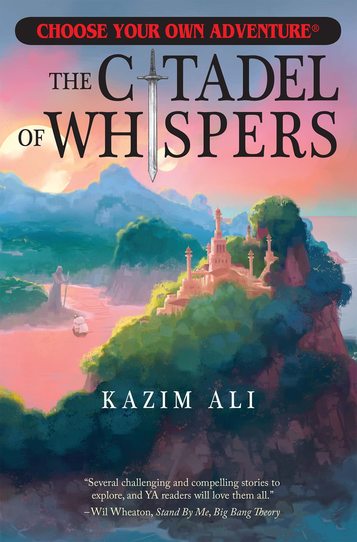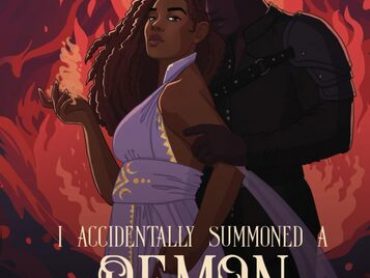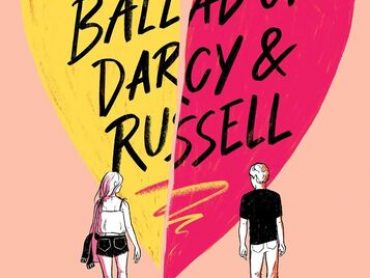Kazim Ali is the author of The Citadel of Whispers. The Citadel of Whispers is a choose your own adventure story . The book has several challenging and compelling stories to explore. This novel is Kazim’s first young adult novel that he has written. YEM was able to speak with Kazim about his writing process, his favorite books, and advice he has for other writers.
Young Entertainment Mag: Do you remember the first time you wanted to become a writer?
Kazim Ali: Very very early. When I was in first grade my sister had a book about the (then) nine planets. I rewrote the book in my own words with my own drawings and gave it to my teacher and told her I’d written a book. She proclaimed me an author and made copies for everyone in the class. My sister was furious but no one else seemed to mind.
YEM: You write a lot of poetry. What do you like the most about poetry?
Kazim: Poetry is my greatest pleasure. I love the sounds of words, the rhythm of language. If I could have been a musician or a dancer I would have. But I suppose I am both of those things, only in language.
YEM: Your book The Citadel of Whispers is your first YA book. What made you decide to write for the young adult audience?
Kazim: I’d always loved fantasy stories, science fiction stories too but most those that veered into the tropes of fantasy and/or had fantastical elements (for example, the very first Star Wars–which I saw in the theaters in its original release) or Dragonriders of Pern). I’d read the series of Tolkien, Lewis, Eddings, and Brooks. I played Dungeons and Dragons from childhood through college and beyond.
I even began a novel with many elements of the Citadel of Whispers in it but after 15,000 words or so I couldn’t figure out where or how to take the story next. It wasn’t until I started developing it in the interactive and YA form that it really took off.
There’s something more exciting about a fantasy that stays on the side of fable, that stays in a safe and colorful world. It’s not there can’t be danger or even death: in fact many of these books are known for the dire endings characters come to. But even in those old gaming sessions where someone is devoured by a dragon, the stories are told with relish, even humor. It was importantly for me to retain the swashbuckling aspect of the story even when the characters were in danger.
YEM: What does your writing process look like?
Kazim: It differs. When I write poetry or fiction, it takes a long time: a long time living in my head and then after a first draft a long time to revise and shape. Weeks or months or years, in some cases. With nonfiction it can be faster, and with this YA book it was even faster. I outlines all the choices and paths first on big poster boards, attaching new branches when I needed to.
I plotted the book in my head for about a year, then outlined it all, and then it took me about four or five months to actually write it down, veering off the outline in significant ways of course! No matter how much planning you do, a book always makes itself in the actual writing.
YEM: Who are some of your writing inspirations?
Kazim: For this book, definitely Anne McCaffrey (who wrote the Dragonriders of Pern series), in particular the Harper Hall trilogy, definitely the fabulist of wrote the The Thousand and One Nights, and for color and humor the writers of the comic books series Amar Chitra Katha, which I was addicted to as a young person in India. I also have to cite Edward Packard, R.A. Montgomery, Anson Montgomery, Kat Factor, Rose Estes, and Rana Tahir, all of whom wrote interactive YA fiction, including Choose Your Own Adventure.
YEM: What are some of your favorite books?
Kazim: I have too many to say. Whenever I am asked this question I just list the books I am currently reading. Which are: Sir Gawain and the Green Knight (W. S. Merwin translation), the novel One of Ours by Willa Cather, the memoir Manimal Woe by Fanny Howe, a novel Em by Kim Thúy, and the letters of American poet James Merrill. I do normally also read YA, recently the Hardy Boys, Tom Swif,t and Benjamin Saenz’ Dante and Aristotle Discover the Secrets of the Universe and Aiden Thomas’ Cemetery Boys.
YEM: What is something you would like your readers to learn or take away from reading your books?
Kazim: The joy of listening to and telling stories. That a story doesn’t always have to be told the same way. That young people have political agency to change social and material conditions in the world.
YEM: Do you have any advice for those who want to become writers?
Kazim: Read a lot, and not only of the thing you want to write. Read in all time periods. Read all the ancient epics and stories and myths from classical and medieval and modern times.
YEM: What is a line that you have written that you would consider to be one of your favorites?
Kazim: Whatever I wrote last. Which in this case is: “To talk of God is no small matter.”
YEM: What has writing taught you about yourself?
Kazim: Everything. I think in writing. I often don’t know what I think until I start writing it down. And not always in type; I most often write long hand, with a pen, on unlined paper.
YEM: Is there someone that always reads your writing first?
Kazim: There isn’t. And I don’t usually show what I write to anyone for a long time.
YEM: Is there a specific genre you hope to be able to write in the future that you have not really tried so far?
Kazim: I love the genre of fantasy, but I would like to try other genres inside it: perhaps a mystery, like when (in the Avatar: the Last Airbender) Aang tried to prove that Avatar Kyoshi was innocent of a murder committed hundreds of years before.




